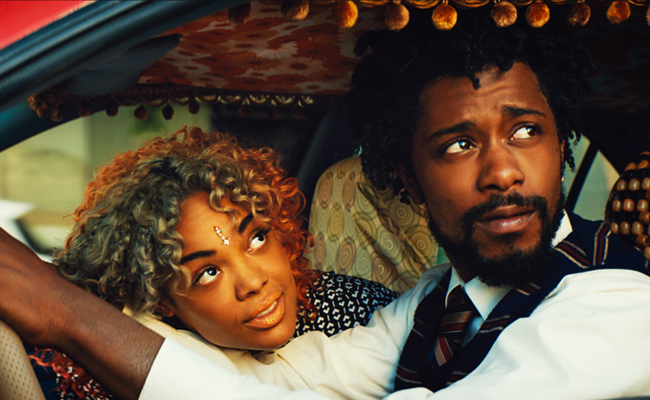
Sorry to Bother You, the writing and directing debut of Bay Area hip-hop legend Boots Riley, is really hard to describe in a review. That’s a big part of what makes it so great. Fewer movies are getting made these days, and the ones that do get made tend to fit neatly into a few categories. For the most part, you get either the mass market blockbusters meant to appeal to everyone, or the limited market arthouse films meant to appeal to awards voters and the fairly narrow demographic that pays attention to such things. “Indie films” are increasingly no longer films that don’t fit the blockbuster mold, but films that fit the indie film mold, which is almost as constraining.
Sorry To Bother You doesn’t fit that mold. It’s a film with a non-literal sense of reality featuring giant special FX penises and an overtly pro-labor message directed by a progressive activist. It doesn’t fit any mold, and that makes it incredibly refreshing. To see a singular vision, to witness a film that doesn’t feel like it was focus-grouped or tailored made for specific appeal truly feels like an event. This is the movie worth talking about.
Lakeith Stanfield (a future Oscar winner — I’ve never been so sure of anything) plays Cassius Green, a laidback Oakland stoner who doesn’t quite understand or fit into the hyper-hierarchical society into which he’s been born. Status seems so arbitrary yet so important. In one early scene, he goes to a dive bar with a friend and finds out that it has a VIP room. He gets the password, goes into the VIP room and finds that it’s loud, crowded, impossible to get a drink, and above all uncomfortable. He comes back out to find his friend and tells him how great it is in there and how they’ve got to get back.
Slightly stony and given to profundities (the first scene is Cassius in bed with his girlfriend, Detroit, played by Tessa Thompson, asking if she ever gets scared thinking about the sun burning out and the universe imploding), Cassius doesn’t quite understand the world, but he knows he has to start paying rent to his uncle (the incomparable Terry Crews in full dad mode) so that his uncle can keep the house. After a comedy sketch job interview that’s so surreal that it’s almost an Eric Andre Show bit, Cassius ends up getting a job at a call center. Riley depicts each call as Cassius’ desk flipping over and ending up in his call recipient’s house — a dad at his dinner table, a woman having sex on her couch. As soon as they hang up the illusion shatters and Cassius flips back to his call center reality.
Much of Sorry To Bother You takes place in this kind of stylized hyperreality, the kind of ostentatious storytelling that might normally draw attention to the storyteller more than the story. In Boots Riley’s hands though, it doesn’t feel self-indulgent. He’s so consistently clever, both visually and verbally, and just vulgar enough, that the stylistic touches never feel like self-regard. They feel like… well, style. They feel both tasteful and transgressive, like Riley has found this whole new way of being entertaining that the rest of us just weren’t creative enough to notice.
Cassius starts to excel at his job, thanks to a tip from an old-timer played by Danny Glover, who convinces Cassius that he has to use his Caucasian voice. Cassius (how much symbolism should we read into Muhammad Ali’s old name?) turns out to be a Caucasian-voicing prodigy, with voice provided by David Cross. He essentially gets invited to the VIP room of his call center, where he meets his eye-patched new mentor Mr. [Redacted], whose Caucasian voice is provided by Patton Oswalt. Eventually, Cassius becomes the pet of the big boss man himself, played by Armie Hammer with graying chin whiskers.
Spoiling too much of Sorry To Bother You would be one of the worst things I could do, but suffice it to say, Cassius gets into a situation where his new boss, a possible slave owner, wants him to become the Martin Luther King of… well, a group I won’t spoil. There are some parallels to Get Out, especially in a scene in which Cassius’ co-workers keep goading him to rap, but Sorry To Bother You is about more than just race, and the dumb things white people say (no disrespect to Get Out, which was also smart in a much more streamlined way). Sorry To Bother You is about race, but it’s more about the hierarchical and predatory society underpinning it. It has an activist message about organized labor, but it’s also about the challenges of organizing and the dangers of being co-opted.
A movie with this strong of a message can easily come off preachy, self-righteous, and didactic, but Riley’s sense of humor and flair for absurdity save it from any of that. Boots Riley feels compelled to say but doesn’t presume to know. He has a way of dreaming rather than grandstanding, of pondering rather than prescribing.
I once heard a professor once say that the root of every story is the idea that “It’s kind of like…” Which is to say: it’s a feeling that you can’t quite tell but have to show. I can’t remember the last time I saw a film that embodied this idea as well as Sorry To Bother You. Boots Riley is never telling, always showing, unencumbered by the rules of narrative or reality and always with his sense of humor firmly intact.
Sorry To Bother You is like Charlie Kaufman meets Pinocchio. It’s like Terry Gilliam meets Atlanta. It’s the most complete combination of style, satire, and comedy I’ve seen in a long time.






